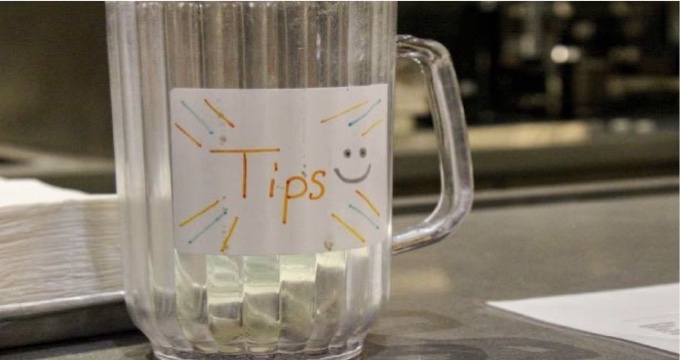Senior Wilson Tibbits has held a job all throughout his college career. In fact, working is something he’s enjoyed doing. When given the opportunity to work at Campus Gas, Tibbits was thrilled to bartend in a fun, social environment where he could see friends and meet new people.
He describes it as “the perfect college job,” yet he has found himself appalled by one component of the job he did not expect — most Wake Forest students do not leave tips for their bartenders.
In North Carolina, tipped employees can be paid $2.13 an hour with an expectation that they will be tipped at or above minimum wage. If the tips they make do not meet standard minimum wage of $7.25 an hour, then the employer must pay the difference. According to multiple businesses that are heavily frequented by Wake Forest students, a small portion of students leave tips.
Campus Gas Manager Meg Jones-Kelly estimated that 12% of customers — of which Wake Forest students are the majority — tip at Campus Gas.
“Students should be tipping a bartender making $3,” Tibbits said. “Even if it’s not one of your friends and especially when you’re paying with a card that’s not yours.”
A widespread issue
This phenomenon is not exclusive to Campus Gas, as several other businesses that are popular among students report similar patterns from their Wake Forest customers.
Joe Cho, a recent graduate of Wake Forest, has worked at Dough-Joe’s Doughnuts for five months. Cho said the coffee shop’s cozy atmosphere and conveniently walkable location in Reynolda Village draws a large demographic of undergraduates, Cho estimates that Wake Forest students make up around 40% of Dough-Joe’s total customer base. He also estimates 10 to 12% of students leave a tip either in cash or on the Squarespace app that transforms an iPad into a register.
“The screen [used to pay with a card] prompts you with questions about whether you want to be tipping or not, and they flat out just ignore it and walk away,” Cho said. “They don’t even acknowledge that the screen is prompting you questions about tipping, and we’re left pressing ‘Skip Tip’ most of the time.”
For some Wake Forest students, this is a factor of where they believe their tip is going.
“When it’s one of those [iPads] I don’t tend to tip, just because it’s typically not going to the server, it’s going to the establishment,” Eli Patrick said. “I’d rather just tip the person that’s doing the labor as opposed to tipping the place, where it’s going to get divided evenly among the manager and staff.”
Other students do not differentiate between the type of service or the tip’s recipient when determining whether or not to add the extra 18, 20 or 25%.
“I tip because I used to work in service,” said sophomore Ava Jochim. “So I tip — I even tip when they flip the screen around when I buy a coffee… unless it’s really bad,” she added.
Cho noted that most customers forget that when they pay with a card on the popular Squarespace app, which has over 3 million live sites, they can see the name on the card and whether or not the customer left a tip. He has witnessed the same pattern that Tibbits has amongst students.
“Most of the time it’s their parents’ Amex cards, and they don’t leave tips,” Cho said. “And we’re just like, ‘Huh, that’s so funny.’”
Cho is taking a gap year to work and save money for graduate school, while Tibbits is saving and supplementing his bank account as he awaits graduation. However, for many of their co-workers, this is their full-time career — and tips make a huge difference for their families.
Tibbits remembers an instance in which a coworker asked him to cover her shift on Halloween, so she could take her children trick-or-treating.
“She’s working this job to support her four kids and I’m working this job so I can have a little bit of spending money,” he said. “Please, start tipping.”
Why it’s called gratuity
Kelly Foltz has been bartending at Earl’s for a year and often works 9-to-12-hour-long shifts at the bar known for hosting “College Night” most Thursdays. On any given Thursday, Earl’s welcomes anywhere from 150 to 300 Wake Forest students. Manager Mychal Julian estimates that half of their business comes from Wake Forest students, noting the numbers fluctuate higher or lower depending on the academic calendar and various events, such as graduation weekend.
Foltz explained her experience with Wake Forest customers was “kind of like yin and yang” as far as their behavior and tipping habits.
“A lot of them are very respectful of our services, and there’s quite a few that are not as respectful as others,” she said. “Some act like we are beneath them and that we should be thankful that they are here.”
Foltz attributes the poor manners to a general unawareness of how the service industry operates and does not believe students aren’t tipping out of spite.
Students who have had experience working in the service industry expressed that tipping is an important part of courteous behavior. “I think providing the service and not getting tipped for it is really frustrating,” sophomore Anne Rupnik, who previously worked at a snack shop at a golf course, said.
Both Julian and Foltz believe that having Wake Forest customers is a positive thing for the establishment as well as the atmosphere.
“We work so hard to accommodate … each customer. That’s what we’re here for, and it’s what we love doing,” Foltz said. “It’s not necessarily the amount you tip; it’s showing gratitude — it’s why it’s called gratuity.”
Natasha Heisenberg contributed reporting to this article.









